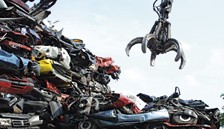By Gareth Roberts
Sixteen car manufacturers, Society of Motor Manufacturers and Traders (SMMT) and the European Automobile Manufacturers' Association (ACEA) have been fined a total of £460 million for colluding over the advertising of what percentage of their vehicles could be recycled.
The joint investigation, which was launched in 2022 and conducted by the European Commission and the UK’s Competition and Markets Authority (CMA), found 16 carmakers were involved as well as the two trade bodies.
They also colluded to avoid paying third parties to recycle their customers' scrap cars, the watchdog said.
The CMA has issued fines totalling £77.6m to BMW, Ford, Jaguar Land Rover (JLR), Peugeot Citroen, Mitsubishi, Nissan, Renault, Toyota, Vauxhall, Volkswagen, the SMMT and the ACEA.
The CMA fines include a 20% settlement discount to reflect that the manufacturers and trade bodies admitted their role in the infringement and agreed to cooperate with the CMA.
For example, Ford has been ordered by the CMA to pay £18.5m, VW £14.8m, BMW £11.1m and JLR £4.6m, while the SMMT was fined £46,800.
A spokesperson for the SMMT told Automotive Management's sister-title Fleet News that "it fully cooperated with the CMA's investigation and accepts its findings".
The trade body said it takes its competition law obligations "extremely seriously and has thoroughly reviewed and bolstered its protocols to safeguard current and future compliance".
Mercedes-Benz, which was also partial to the agreements, reported the suspected conduct to the CMA, and therefore benefits from immunity from any fine under its leniency policy.
Fines totalling €458m (£382.6m) have been issued by the European Commission to the same manufacturers named in the CMA action along with with Volvo, Mazda, Hyundai, Kia and Honda.
When setting its fines, the European Commission took into account the lesser involvement in the infringement of Honda, Mazda, Mitsubishi and Suzuki.
It also granted a reduction to Renault since evidence showed that Renault had explicitly asked for an exemption from the agreement not to advertise the use of recycled material in new cars.
Mercedes-Benz received full immunity for revealing the cartel, avoiding a fine of around €35m (£29.2m).
Stellantis (including Opel), Mitsubishi and Ford also benefited from a reduction of the fine for their cooperation with the commission.
Renault/Nissan received the highest fine from the Commission at €81.4m (£68m), while Stellantis as parent company of Vauxhall, Peugeot, Citroen and Fiat, must pay €74.9m (£62.5m).
Advertising claims
Among other sustainability information, manufacturers are legally required to include details on recyclability in their advertising materials, so customers can take this into account when considering a vehicle’s green credentials before buying.
In this case, the investigation found that all manufacturers illegally agreed that they would not advertise if their vehicles went above the minimum recyclability requirement of 85% (even if the actual percentage was higher).
With the exception of Renault, the manufacturers also agreed not to share information with their customers about the percentage of recycled material used in their vehicles.
Failing to compete against one another in this way is illegal. It also meant customers buying a car from one of these manufacturers were unable to fully compare the green credentials of vehicles when buying, which could have affected their choice.
This kind of behaviour may also lower the incentive for companies to invest in green initiatives.
Most manufacturers took part in this practice from May 2002 to September 2017, with JLR joining in September 2008.
The agreement was set out in a document called the ‘ELV Charta’ – sometimes referred to as a “gentleman’s agreement” – and sought to “avoid a competitive race” amongst the manufacturers in relation to advertising claims of this kind.
This agreement was referenced in emails, internal documents and meeting minutes, and certain manufacturers challenged others when they breached this agreement.
Buyers’ cartel
Vehicle manufacturers must offer their customers a free service for recycling their old or written-off vehicles having no or negative market value (known in the industry as ‘end-of-life vehicles’ or ELVs), and this service is regularly outsourced to third parties.
The CMA’s investigation revealed that certain manufacturers were involved in what is known as a ‘buyers’ cartel’ in relation to this service.
From April 2004 to May 2018, eight manufacturers – BMW, Ford, Mercedes-Benz, Peugeot Citroen, Renault, Toyota, Vauxhall and Volkswagen – agreed amongst themselves that they would not pay companies to handle the recycling of their customers’ ELVs.
This effectively meant the companies providing this service were unable to negotiate a price with manufacturers.
While companies supplying this recycling service can often make money from ELVs, for example, by retrieving and selling the used parts and raw materials, how profitable it is can vary depending on the price of scrap metal at any given time.
Other companies and bodies later joined the unlawful agreement, including the ACEA, the SMMT, Nissan and Mitsubishi in 2006, and JLR in 2016.
Colluding to agree prices in this manner is illegal. It can impact the incentives for other companies to invest – for example, in better and greener technologies.
Trade association involvement
The manufacturers used ACEA meetings to facilitate these arrangements, with the association itself chairing meetings and intervening when manufacturers acted outside of the terms.
The SMMT also attended these meetings and likewise became involved by settling a handful of disputes.
Lucilia Falsarella Pereira, senior director of competition enforcement at the CMA, said: “Agreeing with competitors the prices you’ll pay for a service or colluding to restrict competition is illegal and this can extend to how you advertise your products.
“This kind of collusion can limit consumers’ ability to make informed choices and lower the incentive for companies to invest in new initiatives.”
She concluded: “We recognise that competing businesses may want to work together to help the environment – in those cases our door is open to help them do so.”















Login to comment
Comments
No comments have been made yet.